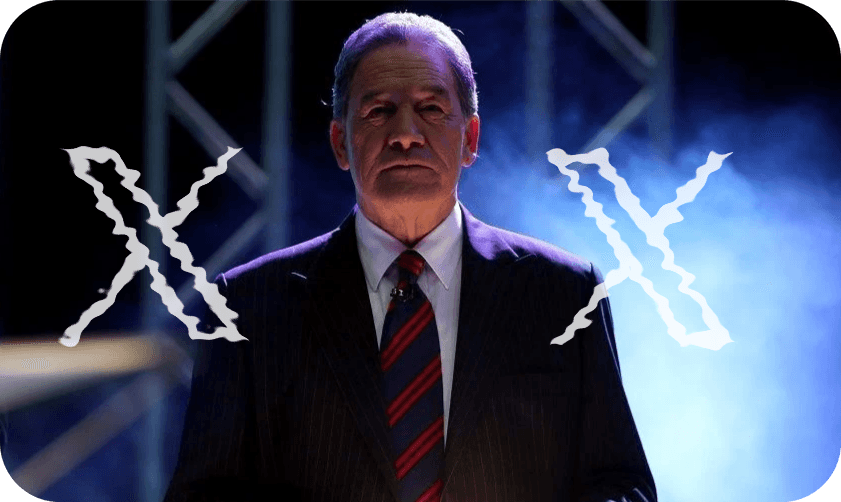I don’t think you have the intellectual fortitude or integrity for this jelly.
In the spring of 2005, two men in their 80s emerged from the bush on a Philippine island. They were soldiers, they said, and they had been in hiding for 60 years, apparently unaware that the second world war had ended.
It must have felt something like that for Winston Peters yesterday. He was shocked (shocked) to learn through reports from the coronial inquest into the 2019 Christchurch mosque attacks that the office of the then prime minister, Jacinda Ardern, had received an email from the terrorist containing his manifesto and information about the attacks minutes before they began.
“To keep this basic information hidden is not only unacceptable it is now clearly indicative of how that office worked,” thundered the former deputy prime minister.
As he stumbled, disoriented and furious, from the jungle, Peters was met by a great clattering of journalists and other insubordinates who seemed set upon saying, well, you know, Ardern’s efforts at keeping a secret must have been a bit rubbish given that she announced precisely that information at a press conference the day after the attacks.
Ardern confirmed on March 16 2019 her office received information about the attacks nine minutes before they started. https://t.co/eMWiDQObNb pic.twitter.com/xQ5MWOPXVx
— Katie Scotcher (@katiescotcher) October 25, 2023
With characteristic stupidity, Peters’ critics, namely the political apologists and feckless media, had misinterpreted his tweet. When he said that “we waited until today to find out, for the first time [etc],” what he meant was that Ardern had not told him this piece of information on the telephone the day before that press conference.
When Peters lambasted those who would “keep this basic information hidden”, he meant those who didn’t tell him and his colleagues the day before. To suggest that the hundreds of thousands of people who watched the press conference are somehow greater in number or importance than the deputy prime minister is as bizarre as it is biased. If it helps, we can put it down to a difference in interpretation between the Rt Hon Winston Peters (a statesman and genius) and you (a fool).
In the face of demonstrably false claims, that was Winston Peters’ explanation. But if you don’t like it, we have others.
The tweet was a test. A test of intellectual fortitude and integrity. While one or two of the so-called fourth estate noted that the information in question had been shared by Ardern and in news outlets across the country and around the world, the majority – the vast majority – who go about the place like cuckolded Philadelphia lawyers did not point this out on Twitter.
Moreover, it was a viral moment, sunshine. Since being trained in the martial arts of social media by the Bad Boys of Brexit, Peters and his Sundance Kid (Shane Jones) have conquered the windswept digiscape, herded the online cattle and sung several powerful songs. Last night’s tweet is the latest “viral” moment. It has been viewed more than 450,000 times (more than the combined vote of the pathetic Greens and the quisling Act) and the top comment is from ordinary chilled out Tweeter Gilda Kirkpatrick, who writes: “Thank you for being our voice, you are our only hope in the government.” Luxon might be able to produce ASMR and bottle flipping reels, but can he do this?
Furthermore, Peters has been demonised, Cindarellaised and marginalised. He has a transcript that reveals Jacinda Ardern failed to tell Winston Peters, avatar of the New Zealand public, about the email. It is in the boot of his car and he is not afraid to go and get it. Give it up for the All Blacks.
And another thing: at the time in 2019, the Rt Hon Winston Peters was doing a great deal of deep contemplation. He was shocked to learn that President Trump faced impeachment. The first time he heard of the unruly tourists was when they did the opera. And he remains convinced that Simon Bridges is the leader of the National Party.
Moreover, with the greatest of respect, kindly consider that Peters was not in fact stating, “We waited until today to find out, for the first time, that the Prime Minister’s Office received information about the March 15 terrorist attack before the massacre took place.” No. He was using the Twitter search function, and merely trying to ascertain if there were any tweets on waiting until today to find out, for the first time, that the Prime Minister’s Office received information about the March 15 terrorist attack before the massacre took place.
Demonstrably, Peters was not able to focus on whether or not he knew about an email being sent to the prime minister’s office when he was so unerringly focused on why he hadn’t been told anything about He Puapua.
Only a cynic would imagine that Peters was seizing on a national tragedy to advance his own interests by attacking someone for the attention of a group of people decoupled from facts. And what are facts anyway? Why is an email? How is a livestream? Who is a rodeo? What is Winston Peters, for that matter? Nobody knows, especially not Christopher Luxon.
Follow Gone By Lunchtime on Apple Podcasts, Spotify or wherever you listen to podcasts.





